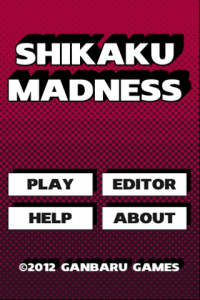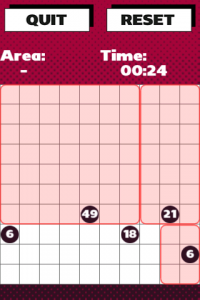Preview: Shikaku Madness
 It's been a day of breaking blog silence! Part two of the Unity tutorial probably isn't coming any time soon, in part due to the fact that I've been pluggin' and chuggin' on a new game. Yes, you can kick me now: it's called Shikaku Madness, and yes, it's a game based on an obscure Japanese puzzle. I'm trying out a few new ideas based on what I've learned from developing iOS apps for the past two years.
It's been a day of breaking blog silence! Part two of the Unity tutorial probably isn't coming any time soon, in part due to the fact that I've been pluggin' and chuggin' on a new game. Yes, you can kick me now: it's called Shikaku Madness, and yes, it's a game based on an obscure Japanese puzzle. I'm trying out a few new ideas based on what I've learned from developing iOS apps for the past two years.
First, here's the sad story: I was pretty lucky that the first app I developed was based on an established game. People know what "nonograms" are, and are actively searching the App Store for such games. I get more downloads of Nonogram Madness now than when I first released it, even. My second app, Revolve Ball, suffers from a "discoverability" problem. Even though most people who try it out think it's pretty interesting, there's no way that people can find it organically. They don't know it exists, and therefore don't know to search for it. If my first app (that I'd spent so much time on) had clunked the way that Revolve Ball has, I might have given up.
 So, for my next game, I'm making an adaptation of an existing genre: something that appeals to logic puzzle fans, and can be discovered organically. I'm also going the "freemium" route of making the app free, while selling more puzzles via IAP. Theoretically this will lower the barrier for entry, and get more potential customers. And, in another attempt to get organic promotion, I'm including an in-game puzzle editor, and allowing players to upload/share levels via the app's website. Who knows if all this nonsense will be successful at all? Not me, that's for sure. But the positive thing is that I've been able to crank this game out pretty quickly in the past three weeks, due to actually having some experience w/ Cocoa and cocos2d now.
So, for my next game, I'm making an adaptation of an existing genre: something that appeals to logic puzzle fans, and can be discovered organically. I'm also going the "freemium" route of making the app free, while selling more puzzles via IAP. Theoretically this will lower the barrier for entry, and get more potential customers. And, in another attempt to get organic promotion, I'm including an in-game puzzle editor, and allowing players to upload/share levels via the app's website. Who knows if all this nonsense will be successful at all? Not me, that's for sure. But the positive thing is that I've been able to crank this game out pretty quickly in the past three weeks, due to actually having some experience w/ Cocoa and cocos2d now.
Anyway, enough about bizness philosophy. What is "shikaku?" It's a type of logic puzzle, of course, where the objective is to cover a grid with squares. The grid has numeric clues scattered on top of it, which help you know where each square is supposed to go. Each square can only overlap one clue, and the number on the clue tells you how big the square is. That's probably not a great description; I'm still working on the best way to explain the concept. However, once you try a puzzle, you figure it out pretty quickly.
I'm hoping to have development wrapped up in about another month or so, and I'll be sure to post my continued progress and the results of my app experiment here. Hit me up if you'd like to get an ad-hoc copy of the game!
Comments
amsoell wrote on :
I, of course, would love to try it out. You actually got me interested enough that I'd like to check out some existing iOS or web-based versions of this.
Nathan wrote on :
The company that invented the concept has some iOS apps, as well as some free Flash-based puzzles on their website: http://www.nikoli.com/en/puzzles/shikaku/